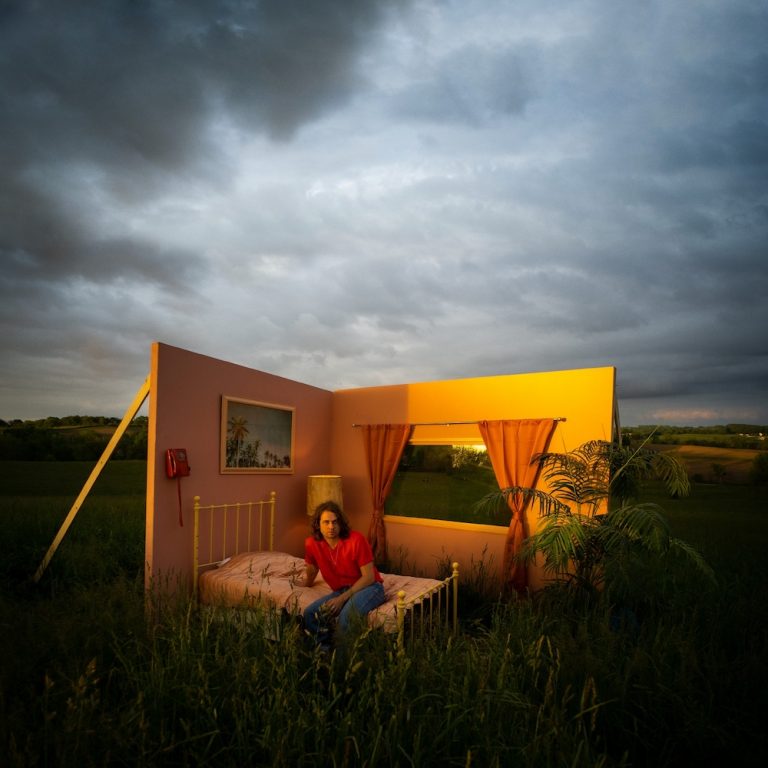Sundowner isn’t a quarantine album per se. After all, Kevin Morby wrote these songs in his hometown of Kansas City in 2018, in a backyard shed-turned-studio, using a Four Track Tascam model 424 he bought off a friend. The songs were later recorded at Texas’s Sonic Ranch in early 2019, well over a year before quarantine. Morby only revisited these songs after the 2020 dates of his Oh My God tour were scrapped.
Nevertheless, it’s impossible not to treat Sundowner as such, with regards to timing as much as aesthetics. Gone are the lighter, jubilant tracks like “OMG Rock and Roll” that punctuated the gospel and piano experimentations of last year’s Oh My God. Gone are the spacious yet well-crafted takes like “City Music”, which elevated Morby’s 2017 album of the same name. Morby has written that the goal of Sundowner is to “put the Middle American twilight… into sound.” Indeed, Sundowner is a record so committed to this idea that opener “Valley” — with Morby’s soft guitar strumming and introspective lyrics front and center — tips 90 percent of the album’s hand.
This approach succeeds best on the album’s title track, where Morby is slowly pulled away from the world he knows. “I am a sundowner, please / Don’t let the sun go down on me,” he sings, which is a dark and heavy plea given his journey. The serene foundation of mellotron and pump organ work helps give the track a palpable humanity. Morby makes clear the stakes are high.
The sparse percussion and galloping guitar give “Brother, Sister” the ominousness of a western film score. On this track and the climatic “Wander”, Morby wields the use of alliteration and onomatopoeia, blurring the lines between voice and instrument. In some instances, there’s no difference. The overall strength of “Brother, Sister” is questionable, though it’s another solid example of the album’s approach in practice.
Nevertheless, it’s also undeniable that Sundowner as a whole doesn’t compellingly fulfill its mission statement so much as act as a vehicle for Morby’s storytelling. On “Don’t Underestimate Midwest American Sun”, Morby sings about his complicated relationship with his home region (“Don’t underestimate midwest American sun / Try and as you might but you will not outrun the burn”); stretched-out piano chords and flourishes add meat to the song’s bones. However, the drum machine under the chorus undercuts the song’s somber atmosphere by pointing out how minimalist the song really is.
On another album highlight, the seven-minute “A Night At The Little Los Angeles”, Morby describes a host of characters — lovers in the bedroom next door, a man hosting strangers, a joking receptionist. The refrain “Baby, baby, baby,” sung by Morby and echoing backing vocals, weaves the song together as he moves from vignette to vignette. The summer-breeze atmosphere of this track is one of the album’s few deviations (it could find a place on City Music).
Yet the songs following “Little Los Angeles” offer nothing new for listeners. “Jamie”, which centers around Morby’s telling of the titular character’s early death, echoes opener “Valley” almost down to the runtime. The three-minute piano instrumental “Velvet Highway” features Morby’s piano playing aided by rumbling percussion. The track builds to a final minute of piercing keys and thumping percussion that, in the end, goes nowhere. Album closer “Provisions” is an entirely predictable track that again passes thanks to its vivid imagery (“There’s a dead deer in the road up ahead / Must be an omen”; “Puerto Rican bride with tears in her eyes on her wedding day”).
Sundowner bears some resemblance to Morby’s 2016 release Singing Saw. That album excelled in creating a wild and compelling atmosphere because its songs — with their choral support, varied instrumentation, and grittier production — rose to the occasion. On Sundowner, Morby’s storytelling isn’t just the album’s centerpiece – it’s an overcompensation.

